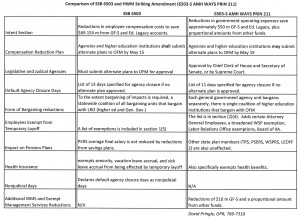Yesterday the House Education Committee moved a number of bills Evergreen has tracked related to teacher preparation.
House Bill 3068 passed out of committee with no amendments. HB 3068 provides that, if scholarship funds are available after qualified paraeducators have been accepted, individuals who participated in one of the Recruiting Washington Teachers programs for high school students can participate in the Pipeline for Pareducators conditional scholarship program.
Though Evergreen expressed support for HB 3068 in general the College expressed concerns that the bill would limit access to Retooling Grants to only those individuals who seek math and science endorsements. This would leave out students seeking endorsements in other areas, such as special education and ELL. Evergreen encouraged the committee to reconsider limiting Retooling Grants to only math and science endorsements.
House Bill 3068 will have a public hearing tomorrow, February 4 before House Education Appropriations.
HB 2654 provides that, if scholarship funds are available after qualified paraeducators have been accepted, individuals who participated in one of the Recruiting Washington Teachers programs for high school students can participate in the Pipeline for Pareducators conditional scholarship program.
HB 2654 passed out of committee amended as follows: (1) In the prototypical school funding formula, removes the separate allocation of one Elementary Math Specialist per elementary school, but includes them as a type of “professional development coach” (which is an existing staffing category in the formula); (2) Specifies that the PESB must develop the standards for the new specialty endorsement by July 1, 2011; (3) Revises the description of the role of an Elementary Math Specialist to include not only direct instruction to students, but also serving as a coach by demonstrating best practices to the regularly assigned teacher, using a research-based coaching model; and (4) Makes the standards for the specialty endorsement reflect the coaching role.
Evergreen shared our excitement about the potential prospect of incorporating a track for this training in The Evergreen State College’s M.Ed. program. In addition, Evergreen shared two ways in which HB 2654 could be strengthened. First, Evergreen hopes the Committee will think broadly with regard to the current terminology in the bill, “widely accessible to elementary teachers across the state,” to mean more than online coursework. Second, we encourage legislators to push for more than the “minimum of additional coursework” required in the bill.
House Bill 2852 passed out of committee with no amendments. HB 2852 excludes public and accredited institutions of higher education from laws that regulate providers of online learning in K-12 schools and authorizes school districts to claim basic education funding for students enrolled in college credit-bearing courses offered by these types of higher education institutions. Evergreen did not weigh in on the bill. HB 2852 will have a public hearing before House Education Appropriations tomorrow, February 4.
A substitute bill for House Bill 3059 was passed out of committee. Substitute HB 3059, among other changes,: (1) Clarifies candidates who complete residency program in 2012-13 must take the new assessment, (2) Adds authority for the PESB to contract for the administration of the assessment with a third party, and (3) Requires all public colleges of education that offer a residency certificate who are not already offering an alternative route program to submit a proposal to PESB, does not allow these colleges to submit a “summary of flexible procedures” as an alternative to submitting a proposal. Instead makes this a part of the proposal.
Evergreen expressed concerns regarding the lack of funding that accompanies the requirement to provide a teacher preparation alternative route program and the impact on institutional mission. HB 3059 will have a public hearing before House Education Appropriations tomorrow, February 4.
House Bill 3035 passed out of committee as amended. HB 3035 requires all school districts to establish revised evaluation criteria and a four-level rating system for classroom teachers and principals and specifies minimum criteria for each system. HB 3035 was amended as follows: (1) Directs the Superintendent of Public Instruction to create common, statewide models for the criteria and the rating system, (2) Beginning in 2013-14, requires all school districts to either: a) implement the common statewide models; or b) submit a modified evaluation system to SPI, (3) Requires any modifications to the teacher evaluation system to have been developed through collective bargaining, and (4) Revises one of the minimum criteria for teacher evaluation to be “communicating and collaborating with parents and the school community.”
House Bill 3035 moved to House Ways & Means.


